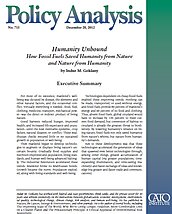Good harvests reduced hunger, improved health, and increased life expectancy and population — until the next inevitable epidemic, crop failure, natural disaster, or conflict. These Malthusian checks ensured little or no sustained growth in population or well-being.
Then mankind began to develop technologies to augment or displace living nature’s uncertain bounty. Gradually food supplies and nutrition improved and population, living standards, and human well-being advanced haltingly. The Industrial Revolution accelerated these trends. Mankind broke its Malthusian bonds. Growth became the norm. Population exploded, along with living standards and well-being.
Technologies dependent on cheap fossil fuels enabled these improving trends. Nothing can be made, transported, or used without energy, and fossil fuels provide 80 percent of mankind’s energy and 60 percent of its food and clothing. Thus, absent fossil fuels, global cropland would have to increase by 150 percent to meet current food demand, but conversion of habitat to cropland is already the greatest threat to biodiversity. By lowering humanity’s reliance on living nature, fossil fuels not only saved humanity from nature’s whims, but nature from humanity’s demands.
Key to these developments was that these technologies accelerated the generation of ideas that spawned even better technologies through, among other things, greater accumulation of human capital (via greater populations, time-expanding illumination, and time-saving machinery) and faster exchange of ideas and knowledge (via greater and faster trade and communications).

